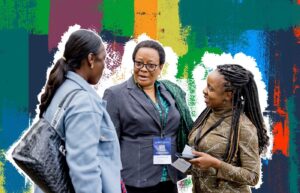
Faces of Open Government: Diana Nicte Sagastume Paiz
In honor of International Women's Day, Diana Sagastume, speaks on the ongoing efforts to address gender-based violence in Guatemala.
Inclusion is fundamental to achieving more equitable, representative, and accountable policies. Open government is one important avenue towards broadening the base of participation in policymaking and ensuring policies reflect the considerations of those most impacted.
Overview | Recommendations | Commitments | Recent Posts
Explore recommendations, partners, commitments, and recent posts in specific policy areas:
Inclusion is fundamental to achieving more equitable, representative, and accountable governance. Despite the progress the world has seen over the past 30 years, communities everywhere struggle with systemic inequalities and deeply-rooted systems of discrimination, including economic, political, social, and cultural beliefs, norms, and laws.
In order for governments to be truly open and representative, they must serve all people – including those who may have specific policy needs; experience physical, intellectual, or social vulnerabilities; or lack political access or influence. Open government is one important avenue to broaden the base of diverse participation in policymaking, and ensuring policies reflect the needs, priorities, and input of those who use them.
Since 2011, OGP members have made over 400 commitments related to the inclusion of historically under-represented communities in open government efforts. While inclusion commitments have addressed a range of underrepresented or vulnerable groups’ needs, certain groups have been more consistently included in commitments across OGP. Commitment communities include those who identify as women and girls, members of the LGBTQIA+ community, youth, people with disabilities, and more country or regionally-specific communities. Commitments range from expanding access to sexual and reproductive health care, targeted employment or education services, inclusive participatory budgeting or access to procurement to increasing leadership and representation in decision-making bodies.
At the core of OGP is the belief that governments should serve citizens, not themselves. To truly serve all citizens, open government reformers must recognize that people are not all equally affected by policy choices. Open government reformers are joining forces with gender and inclusion advocates across the Partnership to better recognize and respond to the lived realities of women, girls, and those across the gender and sexual-identity spectrum.
Open government is an underutilized resource to support the rights, civil liberties, and policy needs of the LGBTQIA+ community. OGP members have made more than 20 commitments explicitly referencing the rights or participation of the LGBTQIA+ community, with one-quarter of members in the Americas making at least one commitment in this area.
Open government is one important avenue towards broadening the base of participation in policymaking and ensuring policies fully reflect the diversity of priorities and experiences of people with disabilities. OGP commitments tend to focus on improving the accessibility of government language and services, along with opportunities for participation in government decision-making.
Young people are the future leaders of open, transparent, and participatory government reforms. Over 40 percent of OGP members today are currently implementing a youth-related commitment, focusing on areas such as increasing youth participation in government decision-making, employment, and improving education systems.

In honor of International Women's Day, Diana Sagastume, speaks on the ongoing efforts to address gender-based violence in Guatemala.

To mark the International Day for People with Disabilities, Agila Barzdienė and Rugilė Trumpytė discuss how socially responsible procurement is advancing inclusion and accessibility in Lithuania.

Discover initiatives submitted to the Open Gov Challenge by OGP members and beyond, through OGP action plans or as standalone commitments.

Learn more about Guatemala's Open Gov Challenge commitment on combatting gender-based violence.

In this interview, marking the International Day for the Elimination of Violence against Women, Daniela Chacón-Mendoza discusses the critical role digital platforms play in combating gender-based violence in politics.
Click here for more information about the Open Government Partnership's terms of use.
Terms & Conditions Close